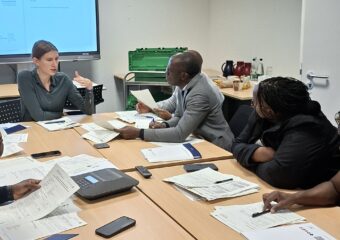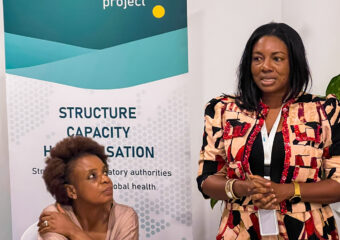Treating severely injured people in Ukraine with telemedicine
Robert Koch Institute and Charité use telemedicine as a crisis intervention tool in the Ukraine war.

Since the beginning of the Russian invasion, Ukraine has been in a state of emergency – in such situations, as a high-ranking federal authority/department the Robert Koch Institute (RKI), is also asked to use its capabilities to provide assistance on the ground. Among other things, ZBS 7 at Robert Koch-Institut offering its expertise in clinical management. One example: telemedicine.
Tried and tested during the COVID-19 pandemic
Through national and international projects, ZBS 7, together with Charité – Universitätsmedizin Berlin, was able to use telemedicine as a responsive crisis intervention tool for the first time during the COVID-19 pandemic. The basic idea in the pandemic: using telemedicine to make specific expert knowledge on the clinical management of novel pathogens available quickly and from any location to hospitals that lack the specialist expertise to deal with infectious and serious diseases. Previous evaluations of past projects have shown, for example, an increase in the probability of survival when the intensive medical care of patients was supported by telemedicine.
On appointment by the German Federal Ministry of Health (BMG) and with funding from the Global Health Protection Program (GHHP), telemedicine has also been used in Ukraine since summer 2022 in collaboration with the Charité. The Charité’s telemedical consultations, which have so far mainly been tested in the context of infectious diseases and intensive care, are now also being used in Ukraine for injury patterns such as burns and ballistic wounds, as well as complex and unusual infections.
The major advantage of telemedicine is that the specialist expertise available in Germany can be made directly available to Ukrainian colleagues without the need to send medical personnel to the crisis area. It is also possible to draw on various specialties that would not have been available on site.
ZBS7 is responsible for the coordination of the project, such as communicating with the Ukrainian Ministry of Health, establishing contact with the hospitals and mediating between the Charité and the Ukrainian authorities. In addition, ZBS 7 supports the Ukrainian authorities in setting up a corresponding clinical network based on the German STAKOB model and, together with external partners, creates e-learning content for training and further education.
The technical responsibility for telemedical consultation lies exclusively with the Charité.
12 telemedical devices in use
As part of the project, the RKI and the Ukrainian Ministry of Health jointly identified twelve hospitals where telemedicine devices from the project being used to support medical treatment would have the most impact. With the Ukrainian doctors on site, the telemedical visits are carried out weekly by the Charité telemedicine team, which consists of experts in intensive care medicine and other specializations such as infectiology, traumatology and pediatrics.
The major focus of the consultation is intensive care cases, with special surgical indications by trauma surgeons, and the management of complex infections by infectiologists, such as MRE wound infections. Charité’s telemedicine specialists accompany the medical team on site via a mobile robot. If necessary, other medical specializations can be called in digitally at any time.
Through the cooperation with the RKI and Charité, the Ukrainian side gains valuable knowledge that strengthens the quality of intensive care treatment, as well as the ability to connect specialized hospitals within one network, while also promoting further training in this highly specialized field. At the same time, the telemedical treatments can also provide new insights into complex intensive care and infectious diseases that rarely occur in Germany, which may be incorporated into recommendations for clinical management.
The Ukrainian Ministry of Health has already signaled a strong interest in the further expansion of the telemedicine network.
More information on the telemedicine project “FUTURE International UKR” can be found on the RKI website. https://www.rki.de/EN/Content/Institute/International/GHPP/projects/FUTURE-International-UKR.html



